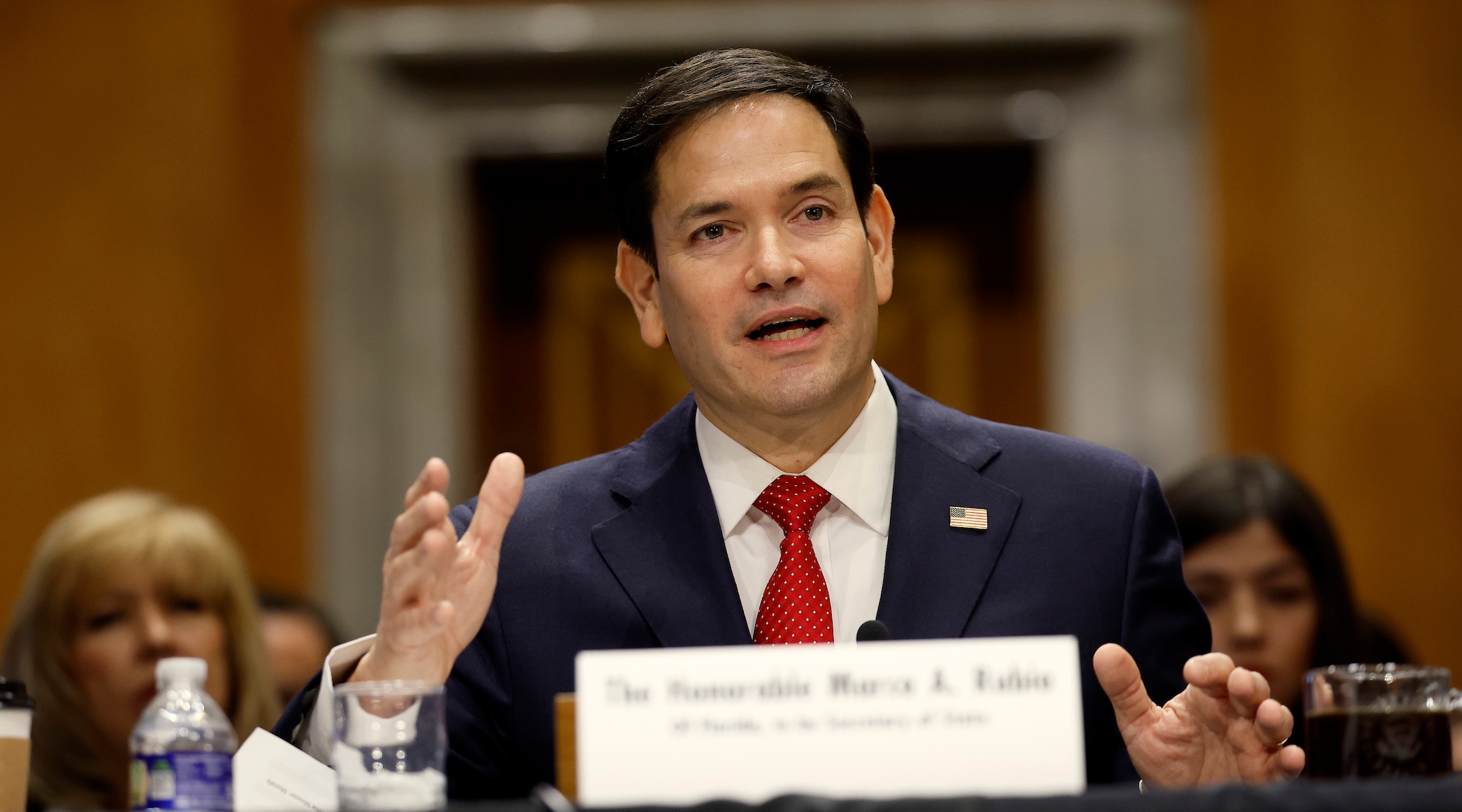Rubio, in Israel-heavy confirmation hearing, says US should revoke visas for ‘a supporter of Hamas’
The hearing was interrupted by news of an Israel-Hamas ceasefire agreement

U.S. President-elect Donald Trump’s nominee for Secretary of State, Sen. Marco Rubio (R-FL) testifies during his Senate Foreign Relations confirmation hearing at Dirksen Senate Office Building on January 15, 2025 in Washington, DC. Rubio, a three-term Senator and a member of the Foreign Relations Committee, has broad bipartisan support from his Senate colleagues. Photo by Kevin Dietsch/Getty Images
(JTA) — In a Senate confirmation hearing that often turned to discussion of Israel, Marco Rubio voiced his view that the United States should revoke the visas of any “supporter of Hamas” in the country.
The Florida GOP senator, who is President-elect Donald Trump’s pick for secretary of state, also used his Wednesday hearing to back an expansion of the Trump-era Abraham Accords and vowed to repeal Biden-era sanctions against some West Bank settlers, in a signal of how the hawkish foreign policy specialist would implement Trump’s priorities in the Middle East.
On the question of visas, which Rubio would have jurisdiction over as secretary of state, he said revoking them for Hamas supporters was “common sense.”
“If you apply for a visa to come into the United States and in the process of being looked at, it comes to light you’re a supporter of Hamas, we wouldn’t let you in,” he said. “Now that you got the visa and [are] inside the U.S. and we realize you’re a supporter, we should remove your visa. If you could not come in because you’re a supporter of Hamas, you should not be able to stay. That’s how I view it.” He added that he intends to be “very forceful” on the issue.
The issue has been a hot topic since the explosion of pro-Palestinian activism, particularly on U.S. college campuses, since Oct. 7, which in a handful of high-profile instances has included open shows of support for Hamas. Trump has vowed to deport students engaged in such activities, a controversial measure that opponents say infringes on the right to freely protest.
Rubio himself had previously called for similar measures in a joint op-ed with Republican Sen. Dave McCormick, who teed him up to make the declaration about losing visas during the hearing. McCormick made a reference to “pro-terrorist violence on our college campuses” during his questioning, though Rubio himself did not define what he meant by the description “a supporter of Hamas.”
In addition to being notably friendlier than Tuesday’s confirmation hearing for defense secretary nominee Pete Hegseth, Rubio’s hearing was also overshadowed by news of the ceasefire and hostage return agreement reached between Israel and Hamas, which was announced midway through his questioning.
Rubio said he was “hopeful” about the agreement, while noting he didn’t have more complete details about it. He praised both the Biden administration and Trump transition team for working “side by side” on the deal.
When discussing the agreement and other matters, he defended Israel’s conduct in Gaza, which has drawn fierce global criticism, and insisted that the Israeli army does not deliberately target civilians, a charge its critics advance that Israel denies.
Rubio also vowed to quickly appoint a State Department special envoy for antisemitism to the position currently held by Deborah Lipstadt, though he did not indicate who that person would be. In his first term, Trump did not immediately fill the position, drawing criticism.
Rubio further signalled a willingness to walk back restrictions Biden’s administration had placed on violent Israeli settler groups. In response to a question from Texas GOP Sen. Ted Cruz, asking whether he would commit to “ending discriminatory sanctions against Jews living in Judea and Samaria,” a reference to settlers in the West Bank whom the Biden administration has penalized for stoking violence against Palestinians, Rubio assented, adding that he was “confident” that Trump’s second term “will continue to be perhaps the most pro-Israel administration in American history.”
Rubio also declared that “the term ‘genocide’ has been appropriated to almost global or international slander,” an apparent allusion to progressive claims that Israel is committing genocide in Gaza, and blasted the International Criminal Court’s decision to issue an arrest warrant for Israeli Prime Minister Benjamin Netanyahu. The ICC, he asserted, “has done tremendous damage to its global credibility,” and also claimed the court may be preparing a “test run” for going after the United States (which, like Israel, is not party to the ICC).
Himself a Cuban-American with a longstanding antipathy toward Cuba’s Communist government, Rubio also declared at one point that Cuba has been “openly friendly toward Hamas and Hezbollah” and trashed Biden’s just-announced move to delist the country as a state sponsor of terrorism (Cuba’s president has led pro-Palestinian demonstrations, including one that had been scheduled for the anniversary of Oct. 7). He also repeatedly attacked Iran.
Repeatedly throughout the hearing, Rubio highlighted what he called “opportunities” in the Middle East, including the fall of the Assad regime in Syria and the weakening of Lebanon and Iran, and noting that such developments could benefit Israel. When asked at one point about the Abraham Accords, Trump’s historic normalization agreements between Israel and some of its neighbors, the senator said he hoped to push Saudi Arabia to soon join them.
As members of Trump’s extended family have benefitted from business deals during his first presidency, including in the Middle East, Rubio also downplayed the idea that they should refrain from doing so. Trump’s Jewish son-in-law, Jared Kushner, recently doubled his financial stake in a major Israeli firm.
Rubio, who is generally well liked in the Senate, is not expected to face any difficulty in his appointment to the position.















